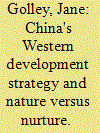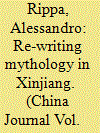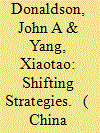| Srl | Item |
| 1 |
ID:
080152


|
|
|
|
|
| Publication |
2007.
|
| Summary/Abstract |
The current trend of rising inequalities in industrial development between East and West China has resulted from a combination of nature and nurture. Given the natural tendency for firms to agglomerate in a developing, market economy, and the numerous geographical and historical factors that have long favoured the Eastern region, it is hardly surprising that this is where Chinese industry has become increasingly agglomerated in recent decades. It is even less surprising in light of deliberate policy choices that compounded, or nurtured, this natural tendency. Left to market forces alone, the agglomeration process should reverse itself (to some extent) in the (very) long-run, as firms relocate to provinces with relatively low costs of production. However, that theoretical long-run is too far away for the Chinese central government, which has introduced a 'Western Development Strategy' to try and speed up economic development in China's poorest region. This paper assesses the likelihood that this Strategy in its current guise will succeed in promoting industrial development in the West.
|
|
|
|
|
|
|
|
|
|
|
|
|
|
|
|
| 2 |
ID:
107141


|
|
|
|
|
| Summary/Abstract |
Difference in values not a decisive factor in conflicts between states
Recently, Dr. Stefan Halper of the university of Cambridge published an article questioning former US assistant secretary of defence Joseph Nye's view that ' China's rise doesn't mean war." Halper holds that the diplomatic, political, and economic values China advances are antithetical to those that formed that status quo global architecture. The author responds that difference in values is not a major4 contributing factor of conflict between major powers and China's fast development is an opportunity, not a challenge, for the west.
|
|
|
|
|
|
|
|
|
|
|
|
|
|
|
|
| 3 |
ID:
101274


|
|
|
|
|
| Publication |
2010.
|
| Summary/Abstract |
This article queries the current mobility of China's rural population by inverting the usual urban perspective and looking at this mobility through exploring the lives of those who do not move. It departs from a micro-analysis of who remains in the countryside in three west China agricultural communities between 2003 and 2005 and links this with an exploration of emergent structural features of rural communities as they are remade in the early 21st century in the wake of the abolition of agricultural taxes and levies. The ethnographic approach adopted highlights the agency, choices and practices of local people in charting their courses in a rural social world being drained of people. It proposes the utility for analysis of family strategies, identifying a repertoire of resourceful and diverse practices through which people strive to recreate and repopulate their social worlds. The argument links the study of historical directions in polity and economy with local and gendered practices in everyday life.
Ellen R. Judd is a distinguished professor in the department of anthropology at the University of Manitoba. She is continuing her work on gender and mobility in rural west China, and currently extending this to an exploration in the political economy of care, investigating the means through which trans-local migrants care for their own and their families' health and well-being.
|
|
|
|
|
|
|
|
|
|
|
|
|
|
|
|
| 4 |
ID:
130435


|
|
|
|
|
| Publication |
2014.
|
| Summary/Abstract |
The Chinese Communist Party has often used history as a tool to serve its political purposes. This article analyzes the ways in which mythological accounts have been manipulated in order to strengthen Beijing's control over the restive northwestern province of Xinjiang. Relying on an analysis of various materials (including museum exhibitions, textbooks and travel guides), I explore how the figures of the Queen Mother of the West and King Mu of the Zhou have been used to assert that Xinjiang has been an inalienable part of China since prehistoric times. The materials analyzed treat mythological texts as valid sources of geographical and historical data, whereas Western scholars largely agree that these cannot provide any reliable information of this kind. In accordance with the tradition of early commentators, I define this approach as euhemeristic, in that it treats mythological accounts as a reflection of historical events.
|
|
|
|
|
|
|
|
|
|
|
|
|
|
|
|
| 5 |
ID:
184723


|
|
|
|
|
| Summary/Abstract |
Why do provincial governments change policy, even when those policies have proven successful? This paper explores a debate regarding the determinants of provincial policy choice and the degree of discretion provinces are permitted in this area. It does so by scrutinizing the shift in Guizhou's development policy from a poverty reduction orientation to a wholehearted pursuit of economic growth, urbanization and industrialization. In contrast to those who argue that central experience, prospects for promotion or local conditions are key factors explaining policy choice, the paper concludes that Guizhou's shift in policy had more to do with the backgrounds and experiences of top provincial leaders. The result has implications for our understanding of central–local relations and local government decision making.
|
|
|
|
|
|
|
|
|
|
|
|
|
|
|
|